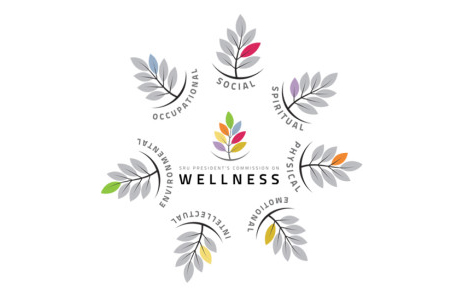“If you don’t take care of your body, where would you live,” says an old Indian saying that President, Dr. Cheryl Norton shared when explaining the main objective of the Wellness Commission.
According to the new Wellness Commission pamphlet, the vision and ultimate goal of the program is to create a culture that embraces wellness as an essential part of life for Slippery Rock University and the surrounding communities.
“We want the community to begin to adopt life long behaviors,” explained Dr. Jeffrey Lynn, co-chair of the Wellness Commission. The program is holistic and balanced, focusing on seven areas of wellness: physical, emotional, spiritual, social, intellectual, environmental, and occupational, Lynn said.
The Wellness Commission is about living a balanced life, not only in a physical sense but also by using the other resources and facilities in Slippery Rock to maintain wellness, explained Dr. Lynn. For example, the Counseling Center focused on emotional wellness, the Health Center on a different aspect of physical wellness and it can even stem into the Robert A. Macoskey Center to learn about environmental wellness, said Dr. Lynn.
“The Wellness Commission is made up of a group of dedicated people across campus who want to bring wellness to the community with programs and initiatives,” Dr. Carol Holland, director of the Counseling Center said.
The programs and initiatives are not only for students but for faculty, staff, admissions, and also members of the surrounding community according to Lynn. Programs include Zumba, Ti Chi, and Yoga for faculty, staff, and administrators, and also initiatives incorporate already existing activities and clubs on campus like the Run Club. A program and class that is open to anyone is the meditation class that teaches meditation techniques to handle the stress of everyday life, Lynn said.
According to Renee Bateman, Coordinator for Health Promotion, another program that is being implemented in the Health Office includes the students’ amount of exercise as part of the new vital signs. If their exercise level is considered too low according to the nurses, they can recommend some free services such as private training for exercise.
“They are creating student wellness champions that help enforce and create wellness, and an example is the HOPE Peer Educators,” Bateman said.
One last program that is a crucial part of the Wellness Commission is the Play Initiative, Lynn said. This initiative is a way to show that exercise can be fun and enjoyable. According to Lynn, some activities include tag and Zumba on the quad as well as Ultimate Frisbee.
“Play Day is a great activity to bring people together and get out of the office and laugh and smile together,” President Norton said.
President Norton explained that she feels a connection with this commission because of her field of work. President Norton has a background in exercise physiology and strongly believes in the well-known phrase, “exercise is medicine.” According to President Norton, during her first job as the director of recreational therapy at the University of Virginia hospital’s psychiatric unit, she saw many instances in which wellness affected an individual’s health.
“I noticed that if the patients would take care of themselves they would feel more comfortable with themselves and have a stronger mental state,” Norton said.
The Wellness Commission is the sixth commission, along with Sustainability, Race and Ethnic Diversity, Gender Identity and Sexual Orientation, Disability, and Status of Women.
“All of the President’s Commissions are values that characterize this campus and we hope to affect the students’ and community’s quality of life they live, and the environment they live in,” Norton said.
According to Norton, a balanced and interconnected wellness just does not happen, it involves a decision and activity.
“We do better what we do best,” Norton explained saying that we can have all the knowledge in the world but without the balanced wellness and the ability to put things into action, that knowledge can lead nowhere.








